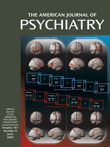On Chronic Fatigue Syndrome
To the Editor: We read with interest the recent review by Niloofar Afari, Ph.D., and Dedra Buchwald, M.D., concerning chronic fatigue syndrome (1), a ubiquitous symptom illness that is characteristically resistant to pharmacological and nonpharmacological interventions. We report the case of a patient whose core chronic fatigue syndrome symptoms responded rapidly and dramatically to a trial of add-on modafinil.
Ms. A was a 50-year-old female health care practitioner with a history of well-controlled major depression, hypertension, asthma, and hyperlipidemia. She began to experience insidious and disabling fatigue, a sore throat, myalgias, subjectively nonrestorative sleep, cognitive problems, migratory joint pain, right-sided carotidynia, and severe postexertional malaise. Her symptoms were initially believed to be due to a mild infectious illness; however, her symptoms progressed unremittingly. Further questioning about her symptoms revealed an absence of episodic “sleep attacks,” cataplexy, hypnagogic or hypnopompic activity, sleep paralysis, lightheadedness, and loss of consciousness.
Despite extensive medical workups by internal medicine primary and subspecialty care services, no organic basis for her symptoms could be discovered. Neuropsychological testing showed normal intelligence and some problems with working memory and learning new information. Polysomnography failed to document any abnormalities, including those that would have suggested narcolepsy. Two cranial magnetic resonance imaging studies had findings that were clinically insignificant. Functionally, Ms. A complained of social withdrawal and an inability to work because of her symptoms, especially cognitive dulling and fatigue. She adamantly denied feeling depressed or being unable to experience pleasure.
Ms. A’s concurrent medication list included venlafaxine, bupropion, propranolol, fluticasone, and albuterol. Bupropion was discontinued because of its presumed ill effects on sleep. Judicious use of clonazepam at bedtime was unhelpful in restoring sleep, while switching her antihypertensive medication to ramipril did not reduce fatigue. A brief trial of low-dose amitriptyline provided only modest relief of carotidynia before being discontinued because of bothersome side effects. She refused to participate in subsequent antidepressant trials, including a monoamine oxidase inhibitor after venlafaxine washout, other augmenting strategies, and nonpharmacological interventions, believing that they would not be helpful in ameliorating a “physical” process. She did, however, consent to a trial of modafinil, 200 mg/day, after discussion of off-label use.
Within 48 hours, Ms. A reported “dramatic” improvements in subjective alertness and a resolution of disabling fatigue. She began exercising daily without postexertional malaise and had resumed limited work duties at the 8-week follow-up. Close monitoring of her blood pressure and serum lipid levels showed no change. Clinical improvements were subsequently maintained at the 3-month follow-up with no limiting side effects.
Modafinil is a novel wake-promoting medication approved for the treatment of narcolepsy-associated daytime sleepiness, although other uses have been described (2). Pharmacological properties include promotion of wakefulness and cognitive functioning, with minimal effects on sleep or blood pressure, a low incidence of restlessness and anxiety as side effects, and a low potential for abuse (3). For these reasons, modafinil may be ideally suited as add-on therapy in patients who suffer from chronic fatigue syndrome, independent of mood effects (4). This position awaits prospective study.
1. Afari N, Buchwald D: Chronic fatigue syndrome: a review. Am J Psychiatry 2003; 160:221–236Link, Google Scholar
2. Teitelman E: Off-label uses of modafinil (letter). Am J Psychiatry 2001; 158:1341Link, Google Scholar
3. Modafinil package insert. West Chester, Pa, Cephalon, 2002Google Scholar
4. Menza MA, Kaufman KR, Castellanos A: Modafinil augmentation of antidepressant treatment in depression. Psychopharmacology (Berl) 2000; 150:272–282Crossref, Medline, Google Scholar



